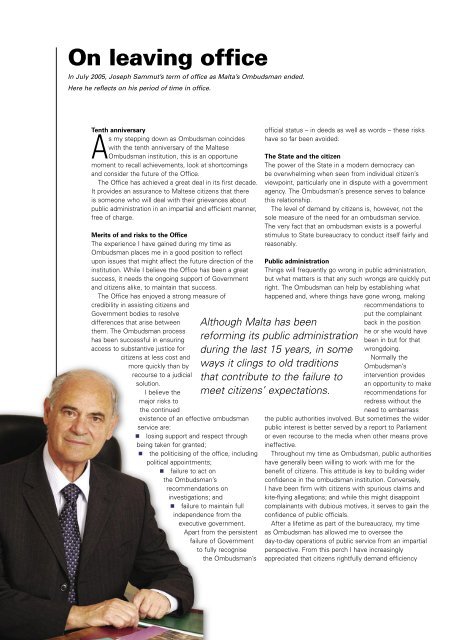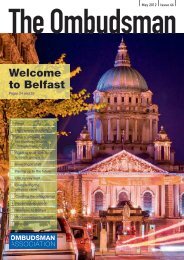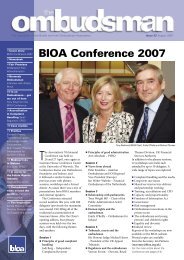29 Ombudsman.indd - British and Irish Ombudsman Association
29 Ombudsman.indd - British and Irish Ombudsman Association
29 Ombudsman.indd - British and Irish Ombudsman Association
You also want an ePaper? Increase the reach of your titles
YUMPU automatically turns print PDFs into web optimized ePapers that Google loves.
On leaving office<br />
In July 2005, Joseph Sammut’s term of office as Malta’s <strong>Ombudsman</strong> ended.<br />
Here he reflects on his period of time in office.<br />
Tenth anniversary<br />
As my stepping down as <strong>Ombudsman</strong> coincides<br />
with the tenth anniversary of the Maltese<br />
<strong>Ombudsman</strong> institution, this is an opportune<br />
moment to recall achievements, look at shortcomings<br />
<strong>and</strong> consider the future of the Office.<br />
The Office has achieved a great deal in its first decade.<br />
It provides an assurance to Maltese citizens that there<br />
is someone who will deal with their grievances about<br />
public administration in an impartial <strong>and</strong> efficient manner,<br />
free of charge.<br />
Merits of <strong>and</strong> risks to the Office<br />
The experience I have gained during my time as<br />
<strong>Ombudsman</strong> places me in a good position to reflect<br />
upon issues that might affect the future direction of the<br />
institution. While I believe the Office has been a great<br />
success, it needs the ongoing support of Government<br />
<strong>and</strong> citizens alike, to maintain that success.<br />
The Office has enjoyed a strong measure of<br />
credibility in assisting citizens <strong>and</strong><br />
Government bodies to resolve<br />
differences that arise between<br />
them. The <strong>Ombudsman</strong> process<br />
has been successful in ensuring<br />
access to substantive justice for<br />
citizens at less cost <strong>and</strong><br />
more quickly than by<br />
recourse to a judicial<br />
solution.<br />
I believe the<br />
major risks to<br />
the continued<br />
existence of an effective ombudsman<br />
service are:<br />
• losing support <strong>and</strong> respect through<br />
being taken for granted;<br />
• the politicising of the office, including<br />
political appointments;<br />
• failure to act on<br />
the <strong>Ombudsman</strong>’s<br />
recommendations on<br />
investigations; <strong>and</strong><br />
• failure to maintain full<br />
independence from the<br />
executive government.<br />
Apart from the persistent<br />
failure of Government<br />
to fully recognise<br />
the <strong>Ombudsman</strong>’s<br />
official status – in deeds as well as words – these risks<br />
have so far been avoided.<br />
The State <strong>and</strong> the citizen<br />
The power of the State in a modern democracy can<br />
be overwhelming when seen from individual citizen’s<br />
viewpoint, particularly one in dispute with a government<br />
agency. The <strong>Ombudsman</strong>’s presence serves to balance<br />
this relationship.<br />
The level of dem<strong>and</strong> by citizens is, however, not the<br />
sole measure of the need for an ombudsman service.<br />
The very fact that an ombudsman exists is a powerful<br />
stimulus to State bureaucracy to conduct itself fairly <strong>and</strong><br />
reasonably.<br />
Public administration<br />
Things will frequently go wrong in public administration,<br />
but what matters is that any such wrongs are quickly put<br />
right. The <strong>Ombudsman</strong> can help by establishing what<br />
happened <strong>and</strong>, where things have gone wrong, making<br />
recommendations to<br />
put the complainant<br />
Although Malta has been<br />
reforming its public administration<br />
during the last 15 years, in some<br />
ways it clings to old traditions<br />
that contribute to the failure to<br />
meet citizens’ expectations.<br />
back in the position<br />
he or she would have<br />
been in but for that<br />
wrongdoing.<br />
Normally the<br />
<strong>Ombudsman</strong>’s<br />
intervention provides<br />
an opportunity to make<br />
recommendations for<br />
redress without the<br />
need to embarrass<br />
the public authorities involved. But sometimes the wider<br />
public interest is better served by a report to Parliament<br />
or even recourse to the media when other means prove<br />
ineffective.<br />
Throughout my time as <strong>Ombudsman</strong>, public authorities<br />
have generally been willing to work with me for the<br />
benefit of citizens. This attitude is key to building wider<br />
confidence in the ombudsman institution. Conversely,<br />
I have been firm with citizens with spurious claims <strong>and</strong><br />
kite-flying allegations; <strong>and</strong> while this might disappoint<br />
complainants with dubious motives, it serves to gain the<br />
confidence of public officials.<br />
After a lifetime as part of the bureaucracy, my time<br />
as <strong>Ombudsman</strong> has allowed me to oversee the<br />
day-to-day operations of public service from an impartial<br />
perspective. From this perch I have increasingly<br />
appreciated that citizens rightfully dem<strong>and</strong> efficiency<br />
8 The <strong>Ombudsman</strong> August 2006





